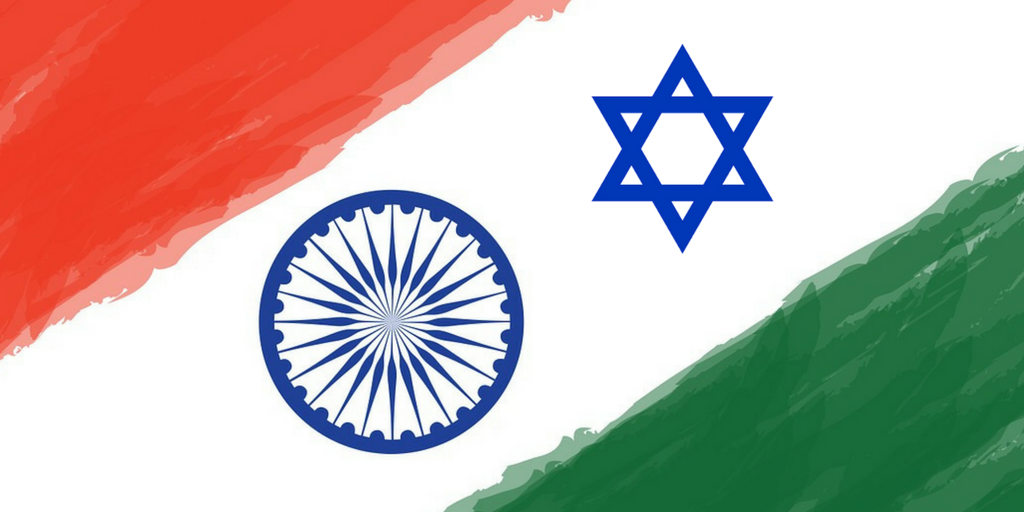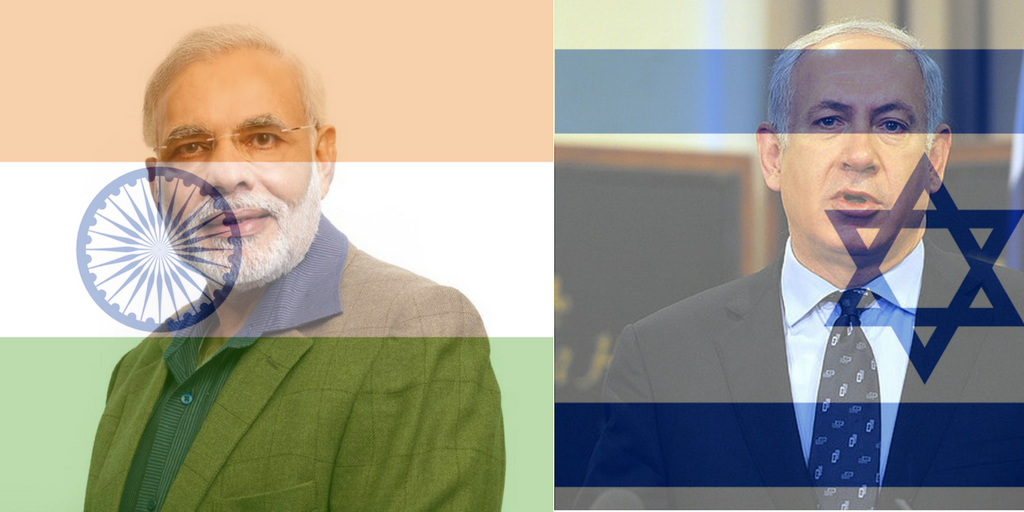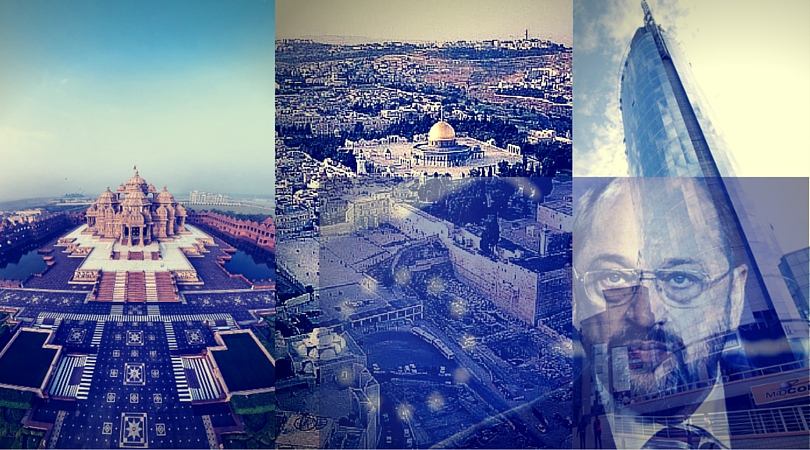As relations between the European Union countries and Israel are getting cooler and more tense, Israel’s relations with India, a future superpower, is getting warmer and stronger. Last November, Israeli President Reuven Rivlin received a very warm welcome reception on his state visit to India. Increasingly, the government of India and its people are moving closer to Israel. For the first time in history, India’s Prime Minister is scheduled for an official visit to Israel to commemorate the 25th anniversary of diplomatic relations between the two countries. Meanwhile, the Indian Defense Ministry announced it has contracted with Israeli arms company Rafael, to supply India with anti-Tank missiles, at a cost of
$1 billion. The Indian government is also considering purchasing pilotless attack planes from Israel.
India and Israel established diplomatic relations in 1992, but when New Delhi was led by the Congress Party, the relationship was cold and reserved. Things changed in 1998, when the People’s Party of Bharatiya Janata Party (BJP) won the national election. The BJP-led coalition known as the National Democratic Alliance (NDA) formed the first non-Congress government in India under the Prime Minister (PM) Atal Bihari Vajpayee. Vajpayee has been a warm friend of Israel. In September, 2003, Ariel Sharon was the first Israeli Prime Minister to officially visit India.
Rediff-India Abroad reported on August 27, 2003, “Israel in recent years has emerged as a strategic partner of India in the latter’s fight against terrorism. Israeli sensors are being used along certain portions of the Indian border in Jammu and Kashmir to plug infiltration. A few Israeli experts are working with the Indian Army in fine tuning these sensors. India has also bought unmanned aerial vehicles and a long-range radar system that is part of the Arrow Ballistic Missile Defense System from Israel, and is expected to soon acquire the airborne early warning and control system Phalcon from Israel. Israeli equipment is also being used in the upgrade of MIG-21 fighters.
In the civilian sector, there are several major joint projects between Indian and Israeli companies. The Hindustan Aeronautics Limited and Israel Aircraft Industries have a program to jointly market HAL’s Advanced Light Helicopter in the international market. Israel is also expected to train and equip a 3,000-strong commando team, a project that is believed to be the idea of Deputy Prime Minister Lal Kishenchand Advani. These commandos are likely to be stationed around the country to react swiftly to terrorist strikes. The cooperation would be taken to a higher level, an official in the Ministry of External Affairs said.”
The 2014 major victory of the BJP over the Congress Party, and the election of Narendra Modi as Prime Minister ushered an even warmer approach toward Israel. PM Modi was familiar with Israel as the Chief Minister of Gujarat State from 2001 to 2014. Modi sent 600 Indian farmers from Gujarat to Israel to attend the Aggrotech Exhibition in Tel Aviv.
The Israeli Foreign Ministry had wisely initiated a long-term policy of developing technological and agricultural ties with Asian states, especially with India. Since Israel is a leading world power in agricultural innovation, it has built model farms throughout Asia (and India) and invited farmers from the region to come for studies in Israel. One such farm was set up in Gujarat, with Chief Minister Modi being deeply impressed. The Israeli contribution to Gujarat economic success propelled Modi to become PM of India. He thus remembered that what was good for Gujarat may be good for India. To add to Modi’s already positive image of Israel, PM Netanyahu was the first foreign leader to congratulate Modi on his 2014 electoral victory.
Something in the nature of mutual respect and admiration developed between Netanyahu and Modi. They twittered congratulations to each other while at the UN Annual General Assembly Summit (New York) of 2014. India has become so important to Netanyahu that he would not excuse members of his narrow coalition of 61 (before Avigdor Lieberman’s Israel Beitenu Party join his government) to travel to Europe, but would allow them to go to India.
[the_ad id=”4744″]
Agriculture and technology sectors notwithstanding, in the security (counter-terrorism) and defense sector, the relationship between Israel and India is flourishing. The Indian government contracted with Israel’s defense industry to purchase a medium-range aerial defense system, to be provided to the Indian army, worth approximately $2.6 billion.
Professor of International Relations at London’s King’s College, Harsh V. Pant wrote a (2/12/2016) column in the Daily O titled “Modi deserves credit for ending India’s hypocrisy with Israel.” His sub-title was “It’s time Tel Aviv gets the recognition it deserves from New Delhi.” Pant pointed out that, “Despite representing a nation that is one of the biggest victims of cross-border terrorism in the world, our esteemed members of Parliament (a cynical reference to the opposition party members) have had no compunction in equating the actions of a liberal democratic Israel with the murderous extremism of a terrorist organization such as Hamas.”
Pant goes on to say that “In contrast to the back channel security ties that existed before the normalization of bilateral relations, India has been more willing, in recent years, to carve out a mutually beneficial bilateral relationship with Israel, including deepening military ties and countering the threat terrorism poses to the two societies. India has also begun denouncing Palestinian suicide bombings and other terrorist acts in Israel. India is no longer initiating anti-Israel resolutions at the UN and has made serious attempts to moderate NAM’s anti-Israel resolutions.” Professor Pant added, “India is the world’s largest buyer of Israeli weaponry and was Israel’s third largest trading partner in Asia in 2013, just after China and Hong Kong. Israel has been a good friend of India but Delhi continues to be shy of demonstrating its friendship. At crucial times, when India needed Israeli help, it got it unreservedly. An open relationship with Israel serves India well and it’s time Tel Aviv gets the recognition it deserves from New Delhi.”
India openly recognized the importance of its relations with Israel when India’s President Pranab Mukherjee visited in 2015. He was invited to address a special session of the Israeli Knesset (Parliament) Plenum. Mukherjee remarked that “The modern period witnessed our parallel struggles against British rule. Our leaders adopted different methods but were inspired by the same human values and ideals… We admire the will and resolve you have shown in building your nation under difficult circumstances.” Mukherjee added, “The Jewish people have always been an integral part of India’s composite society.” He then thanked Israel for “rushing critical defense supplies in 1999.” Mukherjee ended his remarks by saying that India’s “consistent policy has been to build a strong, substantive and mutually beneficial relationship with Israel. We will continue to do so through high level visits and exchanges so that India-Israel relations are accorded the utmost priority. As we approach the 25th anniversary of the establishment of full diplomatic relations, we both seek to expand the vision of our future partnership.”
Israel’s President Rivlin reciprocated by visiting the largest democracy in the world in November, 2016. In his meeting with PM Modi, the latter said: “Two and a half decades of our friendship has brought rich dividends for both our nations. It has also strengthened voices of peace, stability and democracy globally. Your visit provides an opportunity to break new ground and shape new contours of our partnership.”
Following his meeting with PM Modi in New York, PM Netanyahu described Israel’s relations with India as “The sky is the limit.” Israel’s pivot towards Asia, and India in particular, is now apparent.
Originally Published in FrontPageMag.




